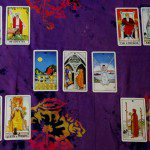The unmediated, first-hand experience of a God is an awesome thing. It’s inspiring and empowering, as you see for yourself just what could be if we had Their perspective on life. It’s also humbling, as you realize that no matter how strong and wise we may be, there are beings who are far stronger and wiser than us.
Back in October I wrote about the reactions some have to the first-hand experience of a God – how some revel in the confirmation of our magical worldview, while others rationalize their experiences away in the hope they won’t have to deal with spiritual beings with minds and wills of Their own.
But there’s a third group of people I didn’t address in that post – those who want to experience the Gods but can’t. A reader reminded me that I promised to explore that topic at a future date and it’s time that I did.
What do you do when you can’t experience the Gods for yourself?
Atheism and non-theistic Paganism are honorable paths
I’m a Pagan polytheist who writes for other Pagan polytheists and I try not to put a bunch of disclaimers in my writing. But for the sake of clarity as much as for the sake of diplomacy, I want to be clear that this post is addressed to people who believe in the Gods or who think it’s likely that there are many Gods. These people want to experience the Gods first-hand but so far it hasn’t happened for them.
If your free and responsible search for truth and meaning has led you to conclude there are no Gods, then I respect your decision. Non-theistic Paganism is an honorable path and I have no need to convert you. The great polytheist-atheist kerfuffle of 2015 was good for blog traffic but bad for my blood pressure… and bad for community-building. We face far too many problems in the coming days to fight with people who should be our this-world allies even if we have strong differences on Otherworldly matters.
If you haven’t had the first-hand experience of a God and you’re good with that, I’ll see you at the roadside trash pickup. But if you really want to experience the Gods for yourself, keep reading.
Most people can experience the Gods
In my experience, sooner or later most people can experience the Gods for themselves. But our mainstream culture presents several impediments to this experience. None of them are your fault.
For all the advances we’ve made toward religious pluralism over the past hundred years or so, Western culture is still heavily dominated by Christianity. It teaches that there is only one God, who is primarily concerned with what you believe. It tells us to put our faith in ancient writings about other people’s experiences, and insists that asking for our own experience shows a lack of faith. Christianity is not monolithic and there are many good Christians who follow the teachings of Jesus instead of the man-made doctrines about Jesus, but it is these conservative and fundamentalist ideas that dominate our culture and impede a mainstream understanding of polytheist concepts.
Another part of our mainstream culture tells us that people who experience Gods and spirits first-hand are primitive, backward, and superstitious. Much of this religious prejudice is intertwined with racism and classism – ways the mainstream tells itself it’s superior to “those people” and pressures us to conform.
There are many more examples. We grow up with no context for the direct experience of many Gods and so we think it’s not possible. Saying “I believe in the Gods” – no matter how sincerely – doesn’t wipe out all these cultural influences. Overcoming them takes time and effort.
Set realistic expectations. Most times the experience of a God is a subtle thing. It’s feeling the presence of Another. It’s signs, omens, and knowing something you had no way of knowing. It’s a thought in your head you’re pretty sure didn’t come from you. Know yourself so you can recognize what’s you and what’s not-you.
Don’t expect something out of a movie. Don’t expect to see something with your physical eyes or hear with your physical ears. These things do happen, but they’re very rare – or at least they are with me and the people I work with.
Perhaps the most important expectation you can set is “experience now – interpret later.” Once you start analyzing an experience, the pressure to rationalize it away will be immense. In the moment, just go with it.
Practice regular devotion. If you want the Gods to talk to you, start by talking to Them. Pray and make offerings. Read Their stories and sing Their songs. Read what we know about Them from mainstream scholarship. Perhaps most importantly, meditate. If you want anyone – God or mortal – to speak to you, you have to be quiet long enough to listen for them, and then to listen to them.
Work with a group. What does the direct experience of the Gods look like? If you’ve never done it, you don’t know. If you can find a group or even a mentor that does this kind of work, you can see what other people do to put themselves in a receptive frame of mind. You can ask questions both about other people’s experiences and about your own.
If we lived in a polytheist society, you’d learn this growing up. We don’t, so you have to learn it where and when you can.
There aren’t a lot of groups that do this kind of work, and some that say they do aren’t doing what I’m describing here. Finding a group that can help you facilitate the first-hand experience of a God can be very difficult. But if you can, do it.
Keep working. It took me five years from the time I got serious in my Pagan practice until I had an experience of a God that was strong enough I couldn’t rationalize it away. It was another three years before it happened again. After that, the experiences started getting stronger and more frequent.
This comes easier for some than for others – it may not take you this long. Or it may take longer. And remember that we are dealing with real Gods with agency – whether They speak to you or not is ultimately up to Them. But don’t give up just because it doesn’t come right away.
But a few are God-blind

What’s the number in the graphic to the right? Most of us can read it easily, and we may not understand and even get angry when a few people say “there’s no number.” But if you have red-green color blindness no amount of wanting and trying is going to help you see it.
There is no test for God-blindness. Given all the cultural obstacles we face in learning to experience the Gods, how can we ever be completely sure the problem is with the individual? But based on the people who have approached me about this and what I’ve read of others’ experiences – and not just in contemporary Paganism – it seems likely.
If you genuinely want to experience the Gods and you just can’t, there are some things you can do.

Burn John Calvin in effigy. Calvinism teaches that their God chooses some for salvation and others for damnation, for reasons unknowable by humans. If that doesn’t make sense to you, then you’re obviously not one of the elect – have fun in hell. This is bad theology from a Christian standpoint – much less from a Pagan one – but it’s part of the mainstream culture that affects us all, whether we’re Christian, Pagan, or atheist.
Your ability – or lack thereof – to experience the Gods first-hand is no reflection of your virtue, and it’s certainly no indication of your position in the afterlife. Live an honorable, virtuous, and where possible, heroic life. Take care of yourself, your family, and those entrusted to you. Treat others with dignity and respect. Leave the world a better place than you found it. The rest will take care of itself.
Never let anyone (including yourself) tell you you’re less of a Pagan or less of a polytheist because you can’t or haven’t experienced the Gods first-hand.
Practice regular devotion. Read, pray, study, meditate, and make offerings. We do these things not so the Gods will give us awesome experiences, but because it is always good to honor the Gods. The more we dwell on Them, the more Their values and virtues become our values and virtues, and that’s a very good thing.
Support the Pagan and polytheist communities. Perhaps you can’t experience the Gods first-hand. But you can make it easier for someone who comes after you to experience Them.
Perhaps your calling is not in ecstatic devotion but in academic research. Perhaps it’s in theology or philosophy. Perhaps it’s in building organizations. There are many things that need to be done to prepare the Way of the Gods. The more we can accomplish, the more we can lessen the mainstream culture’s impact on us, and the more people will be ready to experience the Gods for themselves.
Keep working. I don’t believe in miracles. I do believe in magic. Magic doesn’t make things happen, it improves the odds that they will happen. Perhaps you aren’t God-blind – you just need to be in the right setting. Magic can help put you in the right setting. Perhaps you just need to catch the attention of the right deity. Perhaps there’s only one more thing holding you back, and once you get past it, you’ll have a breakthrough.
Or perhaps not. There is no such thing as certainty in religious matters. But your value as a person and your authenticity as a polytheist are not dependent on your ability to have these experiences.
Honor the Gods. Live virtuously. Leave your corner of the world a better place than you found it. The rest will take care of itself.



















